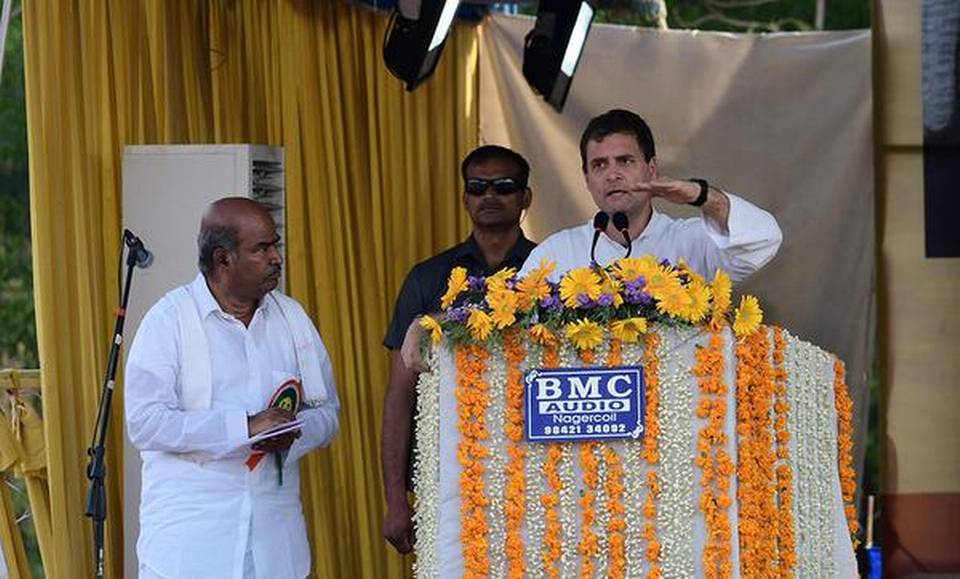B. Kolappan – MARCH 15, 2019
On Wednesday, addressing a mammoth election rally in Nagercoil, Congress president Rahul Gandhi launched a spirited attack on the Rafale deal saying the contract was awarded to [Anil] Ambani, who had no previous experience in manufacturing aircraft. But the Tamil audience did not get the import of his English speech as former Tamil Nadu Congress Committee (TNCC) president K.V. Thangkabalu translated it as, “Ambani will never speak the truth.” There were far too many such gaffes at the meeting to be glossed over.
Translating political speeches to an audience is an art and bad translation is like a body without a spirit. Tamil Nadu’s political landscape has seen both efficient translators and some who have been way off the mark. In the 1970s, Communist leader A.K. Gopalan addressed a public meeting in Tondiarpet in Chennai in English, which was translated by a local leader.
“Realising that the translator was not conveying his thoughts, Gopalan told the crowd, ‘Enakku Senthamizh Theriyathu. En Tamilil pesukiren (I may not know classical Tamil but I will speak in the Tamil I am familiar with),” recalled CITU leader A.K. Padmanabhan, who used to translate speeches of national leaders until being sent to Delhi for party work in 2010.
The Congress has ace translators like former Union Minister P. Chidambaram and Peter Alphonse who have proved that they have few equals in the party.
At a public meeting at Panagal Park, Chennai, MDMK leader Vaiko stopped the person who translated the speech of then Union Minister Ram Vilas Paswan. “People will understand his English well without your translation,” he told the translator.
During the Independence movement, Mahatma Gandhi’s speech was translated by Tamil scholar Thiru.Vi.Ka, who addressed him as Gandhi Adigal first.
“The late Chief Secretary K. Thirviam was a fantastic translator and would translate the speeches of Indira Gandhi. I remember E.V.K. Sampath effortlessly translating Mrs. Gandhi’s speech on the sands of the Marina. Anna and Murasoli Maran also excelled in the art. Journalist Gnani did a great job of translating V.P. Singh’s speeches during his tour in Tamil Nadu,” recalled K. Thirunavukkarasu, a historian of the Dravidian Movement.
“Having a thorough knowledge of the source language and target language alone is not adequate. There should be an ideological connect. Otherwise, a translator will lose track of the spirit and emotional message of the speaker,” said BJP leader H. Raja, who has been translating his party’s national leaders since 1994. Even he slipped up once last year.
Mr. Raja said he first translated L.K. Advani’s speech when he came to Kancheepuram to pay respect to Sankaracharya Chandrasekarendra Saraswathi Swamigal.
Mr. Advani, however, in a meeting at the Island Grounds, said he was always comfortable with the translation of former BJP MP L. Ganesan.
“Holding attention and closely following a speaker is very important for a translator. You can follow five to six sentences effectively and it would be difficult to translate if the speaker goes without some break. Moreover, you should have a good knowledge of the political developments of the day,” said Mr. Padmanabhan, recalling how he found it difficult in the beginning to repeat the words of E.M.S. Namboothiripad’s introductory remarks in Madurai.
Mr. Padmanabhan said that when he was assigned to translate the late Communist leader Harkishan Singh Surjeet, he wondered whether he could follow his English with a Punjabi accent. “He would always pronounce ‘support’ as ‘sport’. Leaders from Andhra Pradesh would make stress on “r’. Bengali leaders will speak in a different accent,” Mr. Padmanabhan said.
Writer Jayakanthan, the late Communist leader P. Ramamurthy and R. Umanath were also good translators.

